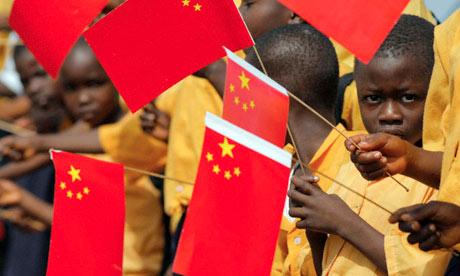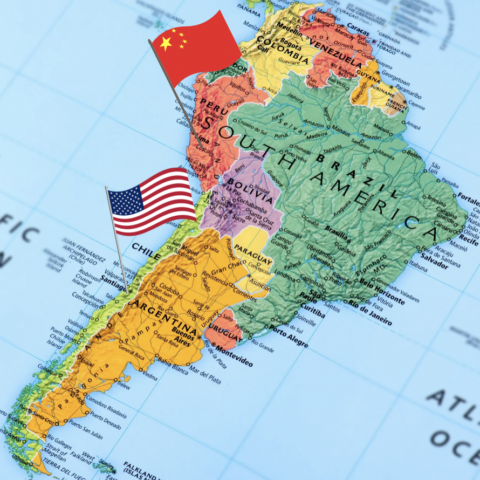By: Matt Oldham

Source: China Africa Project
What would you buy with $75 billion dollars? It could go a long way—a new house, a couple Corvettes, maybe a yacht or two. Even after all of those purchases, there would still be enough money left over to do it 74 more times. China has found an alternate use for this money: trying to buy China. Or at least buy influence in Africa. Since 2000, China has funneled approximately $75 billion dollars to the “Dark Continent.” This “soft power” approach has given China significant economic and political influence in these developing nations. Soft power, a term frequently used in international relations, was coined by Dr. Joseph Nye, a political scientist and former Dean of Harvard’s John F. Kennedy School of Government. In essence, it means setting a good example by setting a good example for a neighbor, using moral and cultural persuasion to do so. In contrast, the United States has often used a “hard power” approach, by means of economic and military prowess. AidData, a computer matrix that calculates foreign aid, estimates that there are 1,500 Chinese programs directed at technological, commercial, governmental, and educational advancement in about 50 nations across Africa. These projects have supported everything from petrochemical plant construction in Nigeria to the donation of container scanners in Liberia to energy investment deals in Zimbabwe. This leads to a pressing question: what is China trying to do?
China could be playing the role of the new big brother, helping out friends in trouble However, signs point to something a bit different—Rare Earth Elements (REEs). REEs are 17 chemical elements found naturally in the earth. Some are used for industrial purposes like lanthanum, which is used in lighting instruments for motion pictures. Some are used for more advanced purposes, like scandium, a major component in aerospace technology. Other REEs can be used in clean-energy technology and even cellular phones. REEs typically go into the computer chips and nitty-gritty technology that helps make everyday devices work smoothly. However, the sinister, and even terrifying thing about aerospace technology is that it is the same technology used in missile delivery systems (e.g., cruise missiles and ballistic missiles). The opening of two rare earth element mines in South Africa, a mineral powerhouse in the 1960’s, increases the speculation that China is pouring in financial aid to further its own strategic interests and technological advancement.
The fear of China’s growing power and influence was epitomized by the launch of a new “hypersonic cruise missile” in January. A hypersonic missile travels between Mach 5 and Mach 10 (3,840 to 7,680 mph). Current cruise missiles only have the capability to travel 500 to 600mph. This hypersonic missile test launch took place in response to a launch by the United States in May, a big stand for the Chinese government and possibly a glimpse into a crystal ball. With an economy growing at alarming rates, the largest standing military in the world, and a huge influx of economic aid into Africa, China stands to be a growing threat to the United States in the future. The abundance of REEs has allowed China to significantly grow their military capabilities—they no longer have just a few ships and a giant infantry. As demonstrated by the latest missile test, China now has the capability to deliver a missile faster than Geico can help save on car insurance. The Chinese monopoly of REEs boasts 95 percent of the worlds mine production making anyone and everyone who wants this material to go through them.
The opposite is true in the United States: a severe lack of REEs. This problem was outlined by the Obama Administration when they filed an official case in the World Trade Organization over unreasonable trade of rare earth metals in 2012. The case was resolved in late 2013 as the WTO ruled that China had to ease its trade restrictions on REEs, a ruling the China has vowed to appeal. As the manufacturing sector in China displaces the need for many American made products the terror of Chinese control becomes more realistic. China is attempting to bypass the third sector of economic development, services, and move into the fourth sector of, high technological services. If successful, high technology can be sold for very cheap due to lax labor laws and regulations. This does not bode well for America as Chinese exports to the United States reached $440 billion dollars in 2013, and the U.S. deficit to China continues to rise. If the Chinese were to have access to U.S. technology, weapons manufacturers across the world would leave the American technology market, and rush into the open arms on the other side of the Pacific.
In response to China using the REE trade for strategic military purposes, the United States has produced a hard-lined attack of strict export control measures against to ensure that their control of REEs does not lead to creation of the same advanced weaponry at a cheaper cost. By limiting the amount of “dual-use” technology that the Chinese government can receive, the United States can, in theory, control the output of China’s military technology. Dual-use technology refers to technology that is used in both military and civilian products. For example, certain computer chips are being used in both missile guidance systems and in X-Box or Playstation systems. These technologies have been in increasingly high demand, and have resulted in very strong regulations by the U.S. Government. Even a simple cell phone cannot be shipped overseas without a stamp of approval by Big Brother. Recently, Chinese leaders have been seeking more lenient trade controls, including: more access to circuit technology, transfers of deep water oil and gas exploration equipment, and increased access to aerospace and electronic technology. Their message is becoming increasingly clear: technological advancement.
So what does all of this mean for the United States? From 1999 to 2009, the United States supplied Africa with $10.1 billion worth of aid, paling in comparison to Chinese aid. Much of this was through food and health services by the State Department’s USAID program. Some money also went towards military intervention and counterterrorism support in countries like Uganda and Somalia. Unlike the Chinese, the United States has done very little to stimulate the African economies. While China was providing power plants and jobs, the United States has been working to eradicate Malaria and promote safe-sex practices. China has flexed its biceps as the big player in Africa, while the United States shutters into the shadows of the ever growing darker continent. While feeding children and building clean water wells are noble causes that should not be overlooked, one must ask if they are in the strategic interests of the United States. These practices have not increased trade in REEs between the two continents, and the problems in Africa are certainly not close to being fixed. Chinese influence is far greater than the United States because of the Chinese ability to follow through on programs coordinated towards economic growth.
There may be a way for the United States to achieve both of these objectives. The war for African REEs must become a two sided front—providing moral and ethical guidance while promoting economic stimulation and trade across the region. A concept Dr. Joseph Nye would refer to as “smart power,” the blending of different approaches to reach a strategic goal. As technological advancement has slowed, it is only a matter of time before Chinese scientists develop weapons systems that are similar to U.S. capability. The only seeming hope for the United States to stifle further Chinese advancement is export control measures and controlling dual-use technology. While these measures have prevented China’s economy from skyrocketing, one can only wonder how long the lion can be kept on a leash. With a military that is ever growing and an economy that continues to grow, not to mention a looming U.S. trade deficit, China has the ability to be the next big player at the table. As the looming threat of China begins to peek over the horizon the mighty power of the West can begin to see its door closing.

